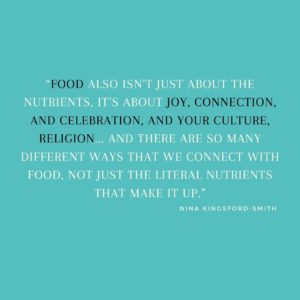The Foundation to Nutritional Health

Do you find yourself hyper focusing on what to eat? Do you often get anxious about the calories in food, eating a “bad” snack or meal, or anxious about eating in general? You are not alone, in fact about 65% of women between the ages of 25 and 45 have disordered eating behaviors. In this blog, hopefully we can debunk the unhealthy mindset surrounding eating and food, find a way to reconnect with yourself and food, and seek a healthier lifestyle through changing your mindset by sharing expert tips on Disordered Eating with an Nutritionist; Nina Kingsford-Smith who focuses on her clients’ relationship with food. This was an amazing chat and a wonderful insight into how the power of words and our mindset greatly impact our health, both mentally and physically. There is a strong relationship between food and mental health, not only through our microbiota and vagus nerve connection, but also mentally through our mindset. Read on to understand this unhealthy mindset and learn some tips from Nina Kingsford-Smith.
Bow and Arrow Metaphor
Many people struggle with bingeing, restricting and dieting. Nina described this analogy created by Isabel Foxen Duke to symbolize the dangerous cycle of bingeing and restricting, which was called the “Bow and Arrow Analogy”. Restriction is pulling back the bow and you pull it further and further; more tension builds up the more you pull back or the more you restrict. You have to eventually let go because you cannot hold on forever, and once you let go, that arrow will go so far in the other direction representing the amount of bingeing. And the tighter you pull back or restrict, the farther the arrow will go so the bigger the binge will be. This analogy can help one understand the dangers of restricting yourself and having that mindset, and this constant negative cycle will hurt you more.
Focus on your Mindset First
In order to break this negative cycle or be healthier, you have to focus on your mindset surrounding food and eating. This was one of the major takeaways from this interview. It is extremely important to focus on your mindset with food first: how you interact with food and how you feel when you eat food rather than the literal nutrients that make up your food. If you feel ashamed, regretful, or upset when you eat or have cravings for “bad” food, then this link between food and negative emotions can be bad for your overall health. Even if you are eating the “right” foods and nutrients, a bad mindset, such as anxiety, will keep you from getting the benefits of these nutrients. Nina strongly recommends working on how you deal with food first. You shouldn’t feel negative about eating or be in unhealthy eating habits such as restricting and bingeing because of your mindset or relationship with food. It is important to establish this good foundation between food and your thoughts/habits before you can work on incorporating and focusing on the nutrition side of things.
Here are some tips you can follow to help change your mindset but remember everything is different for everyone!
- Start with a nonrestrictive mindset
- Eat whatever and whenever you are craving
- Focus on your thoughts, feelings, and behaviors around food to build a strong foundation before you look at specific nutrients
- When you experience negative thoughts, challenge them and address the root of the issue
- Look more into internal cues around food
- What does the feeling ‘hunger’ and ‘fullness’ feel like to you? Learn the feelings of your levels of hunger and fullness
- Focus on intuitive eating
- Pay more attention when you eat, note down how you feel during and after, and read more about Intuitive Eating here
- Remember that if something works for one person, it does not mean it works for you so listen and focus on what your own body is telling you
An important step to changing your mindset is to break down your negative thoughts around food, bring attention to these thoughts and habits, and break it down to the core of the issue (many experience these thoughts because they do not want to gain weight). Then, try to break those cyclic thoughts of shame, regret, and sadness surrounding you eating “bad” foods. Often times when you let yourself eat whatever you want and create a better relationship with eating and food, you end up eating more nutritious food because you end up listening to your body and feel what it actually needs. The foundation to nutritional health is this relationship you have – you have to first address the how and the why (thoughts, feelings and behaviors around food) before the what (what you are eating).
A Common Challenge and How to Overcome
One of the most common challenges to changing this mindset is dealing with the fear of changing your habits and how to stop engaging with these habits. Many realize that these habits are very unhelpful but are scared to stop doing them or thinking about them. Therefore, Nina explained a few ways to help overcome this fear:
- Acknowledge that these habits and thoughts are here for a reason (to protect us) but tell yourself that you are going to be brave and courageous and just try some other things/stop engaging with these habits for a little while and see how it goes.
- Frame changing this mindset in a fun, explorative way so that you do not dread doing it.
- Practice self-compassion for yourself: you are going to mess up, everyone does, but it does not mean you are a failure! You can do it and try talking to yourself like you would talk to a friend and just be kinder to yourself.
“I believe that an important reminder for this journey is that the road to helping yourself is not the same for everyone, not linear, and does not come without struggles, but you can do it.”
The Pendulum Metaphor
As described earlier, the bow and arrow analogy depicts the complicated and damaging relationship between bingeing and restricting. The road to creating a better relationship between yourself and food is hard and comes with struggles, but another amazing metaphor Nina shared with me is on how you can think of this journey. For a long time, you have been restricting yourself, so you are one side of the pendulum and when you start with this nonrestrictive mindset and intuitive eating, the pendulum will swing to the other side, signifying bingeing, for some time. This is because you will be eating foods you haven’t for so long. Bingeing may be part of the process; continue to focus on not punishing yourself as you’re making efforts to change your behaviors and mindset. However, eventually, you will swing back to this middle ground of the pendulum and you will become more in tune with how you feel and what you’re eating and have a good balance with your thoughts/feelings with eating and what you actually eat.
Overall, the very common cycle of bingeing and restricting can be damaging and destructive to your mental health. Many people think to be healthier, they need to focus on their food and the nutrients, however it is critical to have a healthy mindset surrounding food in order to actually be healthier. Nina suggests focusing on your mindset before anything else and there are many helpful tips provided by her on reconstructing your thoughts and behaviors and overcoming the challenges that come with this change.
To connect with Nina, you can find her information on her website linked here and her email is contact@ninakingsfordsmith.com.au
Remember the foundation to being healthier is not the actual foods you eat, but your mindset and how you feel about food and eating and don’t forget to be kind to yourself! You can find the complete Q&A interview video here.
Blog written by Gabriele Spokas
References
- All information supplied was provided by Nina Kingsford-Smith (BHSc NutDMed).


